
Build my resume
- Build a better resume in minutes
- Resume examples
- 2,000+ examples that work in 2024
- Resume templates
- Free templates for all levels
- Cover letters
- Cover letter generator
- It's like magic, we promise
- Cover letter examples
- Free downloads in Word & Docs

11 Social Worker Resume Examples That Worked in 2024
Social Worker Resume
- Social Worker Resumes by Experience
- Social Worker Resumes by Role
- Writing Your Social Worker Resume
Social workers protect vulnerable populations, support families, and help people solve and cope with problems in their everyday lives, all within different settings.
Since social workers support numerous communities, work in various environments, and develop different scopes based on their licensure, creating your social worker resume to target the right job for your career goals can be challenging. (It’s also why social worker job descriptions tend to be rather vague.)
We’ve analyzed hundreds of social worker resume samples from all populations, environments, settings, and licenses to attract the attention of a hiring manager or recruiter so you can get more interviews in 2024 . We created eleven resume samples to help you build an eye-catching resume and check your resume using AI-powered tips.
or download as PDF
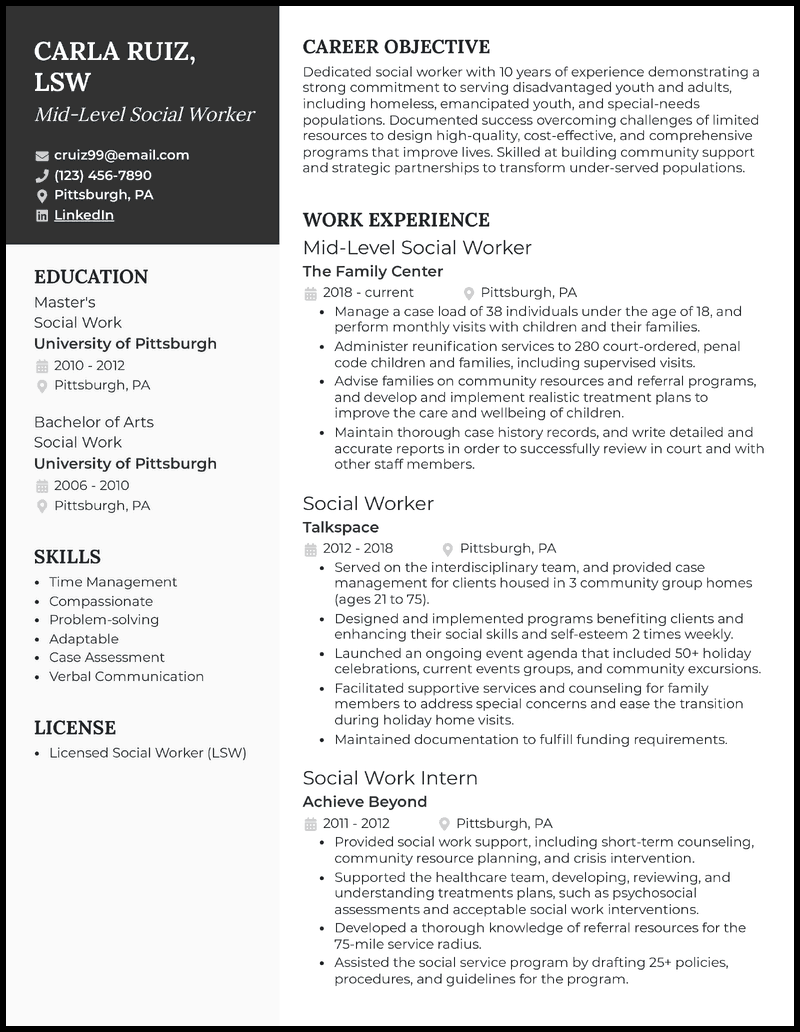
Why this resume works
- Make sure to mention the facility settings where you’ve worked, whether it’s a hospital, school, rehabilitation center, group home, or community facility, so hiring managers see your expertise.
- Social workers typically have high volumes of cases to manage, so you should highlight the number of cases you managed per day/week/month.
- If your case management included court documentation and appearance, be sure to discuss this in your social worker resume.
Social Work Student Resume

- As a social worker, you’ll interact with people from all walks of life. List any experiences that exposed you to diverse backgrounds on your social work student resume to show that you’re prepared to work with complex clients.
Social Work Intern Resume

- An advanced degree in social work and volunteer involvement prove that you chose this career mindfully.
Entry-Level Social Worker Resume
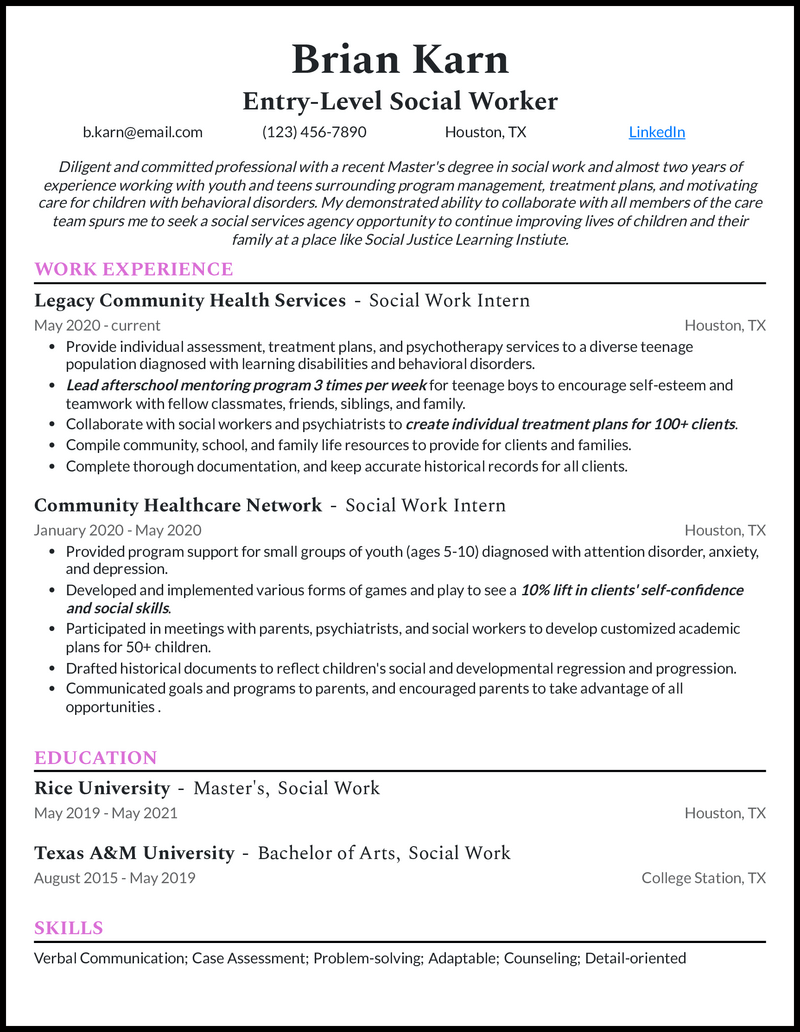
- In your resume skills section , include skills like “verbal communication,” “case assessment,” “and counseling” to reassure employers of your abilities.
- If you’ve participated in any internships, include those over other positions. The goal is always to include the most relevant experience if at all possible.
- Don’t discount any administrative or supportive tasks; hiring managers understand (and want to see) that everyone starts somewhere.
Associate Social Worker Resume
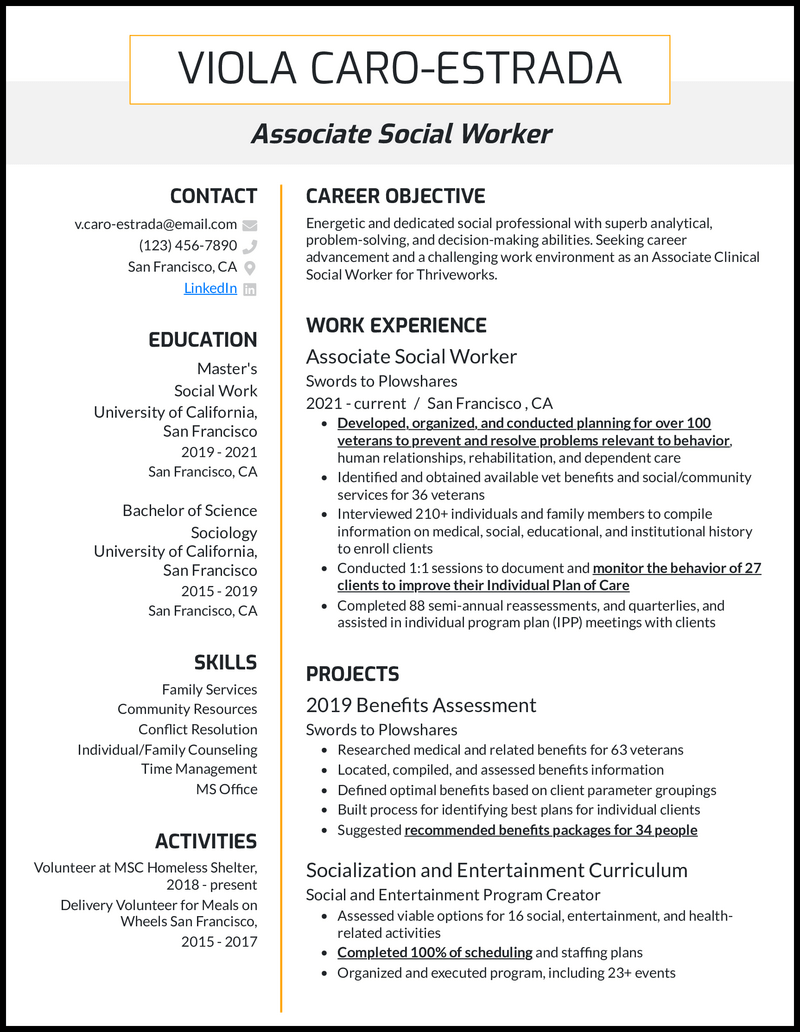
- Consider including work-related projects, activities, or hobbies on your resume to demonstrate your abilities.
- Start strong with a resume objective that immediately shows the reader who you are as a professional.
- If you choose to use an objective, always tailor it to the specific role and job description .
Hospital Social Worker Resume

- For instance, tossing in a LICENSE or CERTIFICATIONS section in your masterpiece could be just the ticket to nudging the hiring manager’s decision in your favor. After all, who doesn’t love someone who goes the extra mile in their craft?
Hospice Social Worker Resume

- Begin every resume bullet point with punchy action verbs like harnessed, managed, negotiated, or persuaded rather than the all-too-familiar phrases like tasked with and responsible for. The point? To paint a vivid picture of your direct contributions to company goals—why would you even risk coming across as a sideliner?
School Social Worker Resume
or downloand as PDF
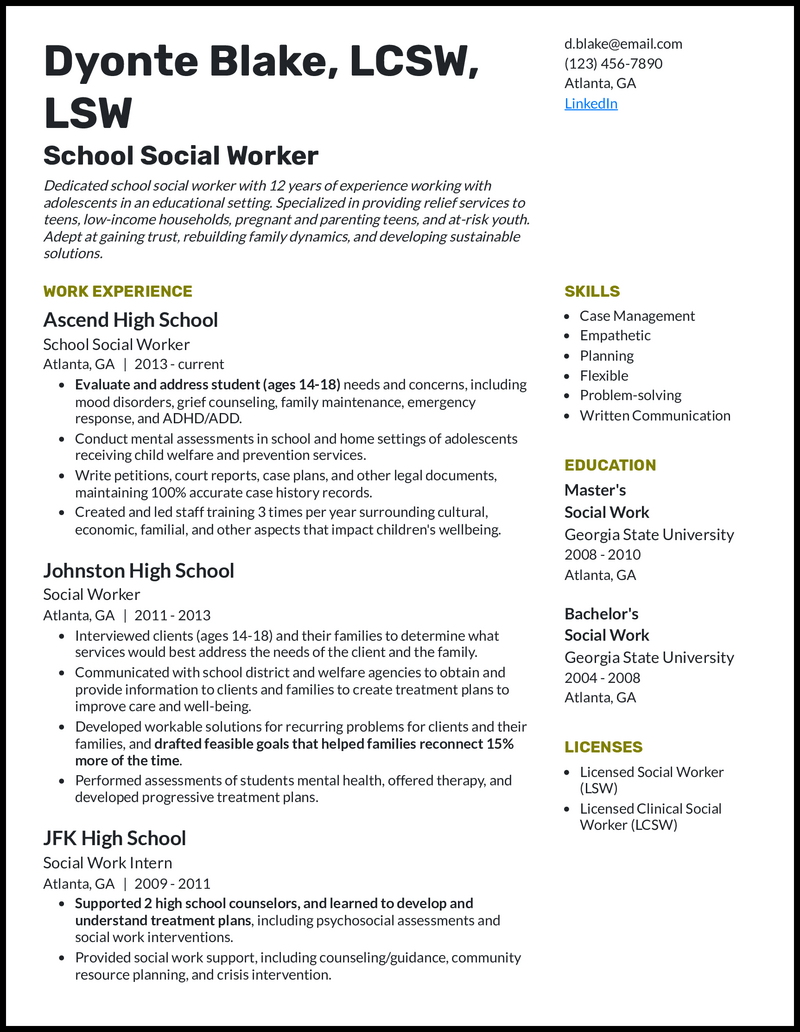
- In your work experience bullets, mention your areas of expertise ( for example, ADHD, grief counseling, teenage pregnancy) to create a targeted school social worker resume that will gain a recruiter’s interest.
- Within the experience of your school social worker resume, be sure to focus on the programs you implemented or supported. This will support the statements made in your resume objective.
Clinical Social Worker Resume
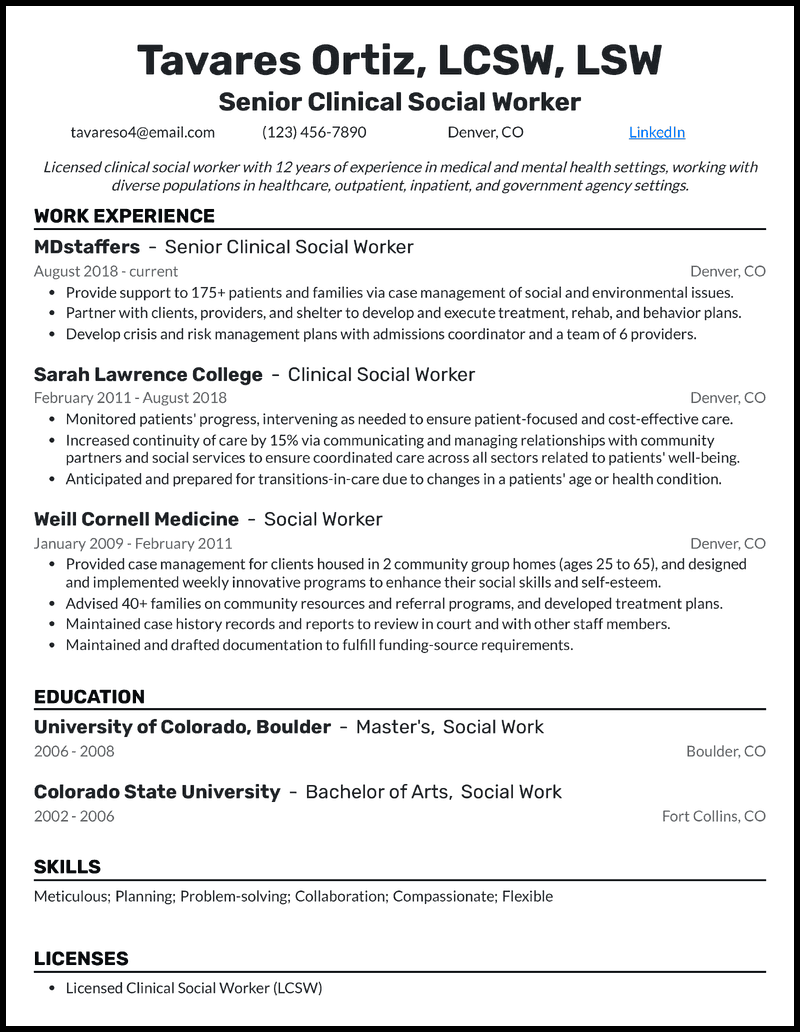
- Be sure to discuss how your responsibilities and leadership abilities resulted in positive changes at your workplace.
- If you have a license designation, put it after your name in your contact header so recruiters can immediately see your expertise.
- Your resume summary should list also the settings where you’ve worked or the clinical settings you want to target for your next clinical social worker role.
Nursing Home Social Worker Resume
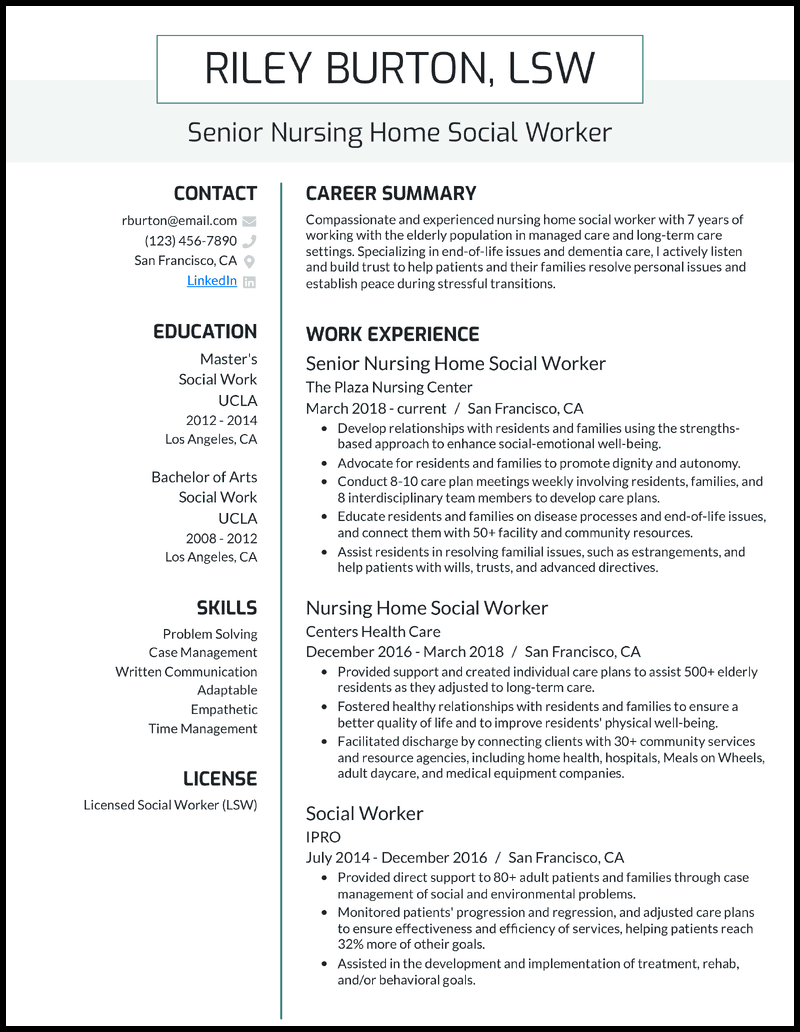
- Include the patient types you worked with, such as end-of-life/hospice or memory care patients, and mention how you demonstrated collaboration and communication in your work experience since those are vital skills for nursing home social workers.
- Highlight your experience educating patients and their families, as well as any community initiatives you implemented, to improve the nursing programs you supported.
- Be sure to check your resume to ensure there aren’t any grammar, punctuation, or spelling errors so you can put your best foot forward.
Medical Social Worker II Resume
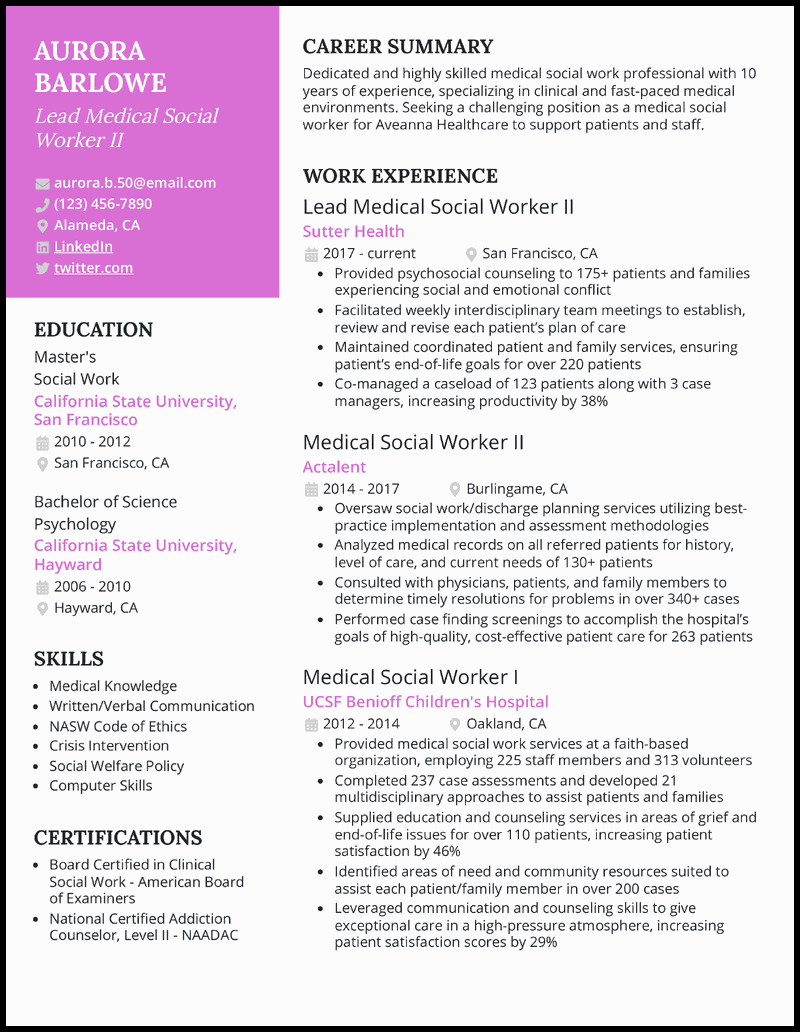
- Only include three to four positions in your work experience, and focus on your expertise from the most recent ten years of jobs and training.
- If you can, keep your bullet points solely about achievements or responsibilities that benefited the company.
- It should be just two or three sentences long to keep it brief. Include the name of the company to which you’re applying, and finish strong with a closing sentence tying directly to the role you’re targeting.
Related resume guides
- Social work cover letter
- Medical Receptionist
Tailor Your Social Worker Resume to Match the Needs of Your Clients

No one knows the demands of your job as well as you do. Working with people who often really need your help is no easy feat, which is why the list of job responsibilities in your field might seem endless. How do you pick the ones that your future employer cares about the most?
The answer is simple: follow the job description! Here are some of the most sought-after job responsibilities you’ll find when searching for a new social worker job.
- Cooperate with the care manager during the care planning process, including setting goals, establishing interventions and milestones, and monitoring client success
- Assess the members enrolled in various care programs on a regular basis and provide detailed reports
- Facilitate monthly support groups and outreach programs
- Participate in multidisciplinary team meetings to discuss cases with providers, primary care physicians, pharmacists, and care management staff
- Design and implement new tools, groups, programs, and services
- Respond to phone and email requests from families interested in being enrolled in programs
Adding skills to your social worker resume
Reverse-chronological format, functional format, and combination/hybrid format
There are several acceptable ways to present your professional experience like a narrative. Hiring managers accept the following resume formats :
- The reverse-chronological format lists your employment experience, achievements, and education, beginning with the most recent.
- The functional format emphasizes your skills instead of your work experience. You place the most relevant achievements or skills near the top to highlight your abilities for the position you’re pursuing.
- A hybrid format blends the reverse-chronological and functional approaches. If you’ve changed industries or have ample parallel experience, you should present the most recent relative aspect toward the top of your resume.
Within the social work industry, recruiters respond best to the reverse-chronological format because it highlights the evolution of your career through progressive acquisition of skills and professional development.
Contact info and header
Your social worker resume explains your qualifications and credentials for the job you’re seeking, but if recruiters don’t know how to contact you, nothing you write will matter. As a result, you need to write and format your contact header effectively. This section should include:
- Title of the position you’re applying for (taken directly from the job description)
- Your city and state
Notice the customized header that lists the job posting title below the name.

ATS and readability
Applicant Tracking Systems (ATS) are computer programs that filter out low-quality, irrelevant, and unreadable resumes. However, they’re not infallible. Sometimes they toss out relevant resumes based on a lack of keywords. Adhering to a few simple conventions, which our AI resume builder helps with, will ensure you pass the inevitable ATS filter.
Beat the ATS with a few simple tips.
- Fonts and font sizes: ATS systems need to be able to scan your resume easily, so keep fonts simple and sizes consistent.
- Header: Adding headers makes your resume easier for the ATS to read.
- Save your resume in multiple formats and confirm that each version looks correct.
- Names: Your name must appear prominently with the associated contact info to make it beyond the ATS.
- Skills: the ATS scans for keywords, so you need to carefully read the job description to include the right terminology.
- Logical Order: A reverse-chronological order is the easiest for the ATS to scan; other formats may be misread.
- Length: Typically, the ATS will toss any resume that’s longer than one page.
How to write your social worker resume
Social workers require licensure, soft skills, and clinical abilities to perform their jobs effectively. Presenting that breadth of experience in an easy-to-read and tight resume format can be challenging.
Luckily, you’re familiar with tricky situations. So, assess your experience and determine your desired job competencies to help you write an effective resume.
Consider the following aspects of your social worker resume:
- A resume objective or summary

Work experience
Crafting your bullet points.
- Quantifying your impact with numbers and statistics
- Top social worker skills
Education, licenses, and specialized training
- Adding projects, interests, or hobbies
- Customizing your resume each job
- Eliminating errors
When to include a resume objective or summary in your social worker resume
Resume objectives and resume summaries are optional, but they can be an eye-catching aspect of your social worker resume. If used effectively, they can be a deal-breaker that grants you an interview.
They should sell your value to the company within two to three sentences. This is the first section of the resume, so it must be compelling and informative to justify its inclusion.
- Above all, your objective should convey how your skills and abilities align with your prospective employer’s mission.
- “I hope to obtain a position to grow and utilize my education. I want to leverage my skills to help clients.”
- This objective is generalized, which isn’t helpful to any employer.
- Instead, tailor your objective to each job to which you apply.
- It should highlight your abilities and show off your specializations to prove you can make the next step in your career.
- “My current and former positions have enabled me to grow as a clinician and widen my knowledge base. I have progressive experience that qualifies me to supervise.”
- This summary is bland and provides no insight into the applicant’s experience or details about their qualifications.
- “LCSW-R with 10+ years of experience working with homeless populations, seeking opportunity with Seek and Save. I designed a job skills program to help clients develop interview skills. It helped 1,200 individuals obtain entry-level employment.”
- This summary highlights the applicant’s licensure and depth of experience, while noting a quantifiable achievement and mentioning the targeted employer by name.
Employers will notice you’ve taken the time to mention their company by name, as seen here.
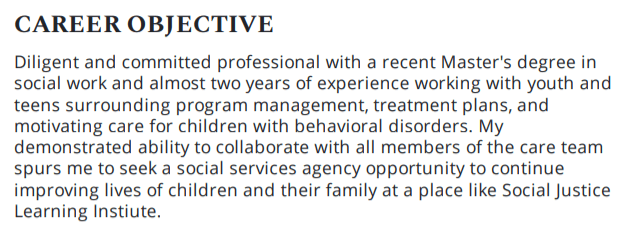
You should be comprehensive, but use space wisely. Generally speaking, focus on recent jobs relative to the work you’re seeking: limit your positions to the last two to four jobs you’ve held. This provides enough space to give substantive details about your accomplishments.
Each bullet point in your social worker resume tells the story of your experience and qualifications. To make sure your bullet points are effective and easy-to-read, choose active verbs that are specific to social work, use a consistent tense , and use sentence fragments without ending punctuation.
Examples of bullet points include:
- This uses a generic verb and provides no detailed insight into the client population.
- There is no information to describe the scope or extent of this achievement.
- This fails to highlight particular clinical skills or describe the client population.
- This specifies exactly what the applicant did and the community they served.
- This highlights specific skills applicable to social work and quantifies their volume.
- This highlights a soft skill with an active verb and specifies the nature of the work.
Quantify your impact with numbers and statistics
Recruiters value statistics because they’re tangible proof of your performance and accomplishments. However, quantifying results in social work is difficult, and it doesn’t always reflect the humanistic nature of the practice. So, include metrics and statistics when you can, but don’t stress about including them in every bullet point. A good rule of thumb is to have 60 percent of your bullet points include metrics.
- Saw 25 clients weekly for CBT and check-ins
- Designed and implemented a revised onboarding system for new client intake with file integration in 6 weeks
- Completed and submitted necessary documentation tracking for patient reimbursement at a 100% conversion rate
Top social worker skills to mention
Social work positions require very specific skill sets, like particular diagnoses, treatment methods, and clinical theories. Review the job description carefully to see what skills they need for the position and thus, what you should include on your resume. Use these terms throughout your social worker resume (when they’re applicable) to catch the eye of any recruiter.
Top social work skills in 2024 include:
- Soft skills: Empathy, active listening, collaboration, critical thinking
- Clinical positions: CBT, evidence-based practice, intake, assessment, treatment planning, discharge
- Management/Oversight positions: Program development, community organizing, budgeting, compliance, supervision
Here’s a solid list of additional soft skills you might include:

Listing your education reverse-chronologically is the best way for recruiters to see your most recent level of experience. Depending on your highest level of education, the section will descend from Ph.D. to MSW to BSW.
Be sure to list any licensures, continuing education certifications, or specialized training, either in the education section or in a separate licenses/certifications section.
If you still need licensure, there are an array of licenses available to those entering the social work field. While license requirements vary by state, most require a bachelo’rs degree. Candidates can earn certifications as a licensed social worker (LSW), a licensed independent social worker (LISW), a licensed clinical social worker (LCSW), or a licensed independent clinical social worker (LICSW) in most states.
Each level requires more education and training, with the LSW being the least demanding and LICSWs being the most stringent and intensive.
Notice the easy-to-read reverse-chronological style highlighting an evolving education.

Should you add projects, interests, or hobbies?
You should omit these optional sections unless you are a recent graduate or applying for an entry-level position. These sections provide color to your resume, but they’re generally considered excessive for higher-level positions. Highlighting and quantifying your professional accomplishments is far more important to recruiters.
If you choose to include hobbies on your resume , they should exhibit your suitability for the position. Social workers should also consider including relevant volunteer experience. If you’re applying for a school social work position, describing volunteer experience with a children’s literacy program would be more suitable than listing your participation in a food pantry.
Customize your resume to each job
Generic social worker resumes sent out for multiple jobs isn’t the way to go. Job postings are highly detailed and reflect the values and mission of their respective companies. As a result, you should tailor your resume directly to the open position.
Read job postings carefully to parse out the active verbs and terminology the recruiter will expect to see. You should check your social worker resume to ensure it mirrors their language and speaks directly to the company you wish to join.
Eliminate errors
Typos and grammatical errors can grab attention as much as an excellent objective statement or well-crafted bullet points. Always double-check your resume for grammar, punctuation, and spelling errors.
Ask relatives, friends, or classmates to review your social worker resume for misspellings, awkward phrasing, and punctuation errors.
Go land your next job!re
A resume that addresses your potential employer’s desired skills is your best chance to land an interview for your new social work position. While using a resume maker , be sure to:
- Strive for a logical and readable format that appeals to both recruiters and ATS
- Communicate your skills and achievements by highlighting how they directly relate to your desired position
- Quantify your performance whenever possible to show measurable achievements
- Customize your resume for each position to assure employers you are passionate about their business
When you’re ready to submit your resume to potential employers, it’s time to start learning how to write a resignation letter to plan a smooth exit from your current role and launch into your dream job.

Resume Guide for Social Workers
Resumes act as the first point of contact between a social worker and his/her potential employer, so it’s critical for resume writers to detail their professional experience and qualifications as effectively as possible. Aspiring social work employees should use their resumes to showcase their certifications or licensures, plus their supervised clinical hours and work experience. Social work resumes should also prove that a candidate is qualified to work with clients and has experience interacting with the people who will be in their care. On top of that, job applicants should tailor their resumes to fit the position for which they are applying.
How to Write a Social Work Resume
- Do Your Research: It’s important for a resume to reflect the skills and work experience required by the position in question. Before drafting their social work resume, applicants should research their potential new employer to learn about which skills they value, and tweak the resume as needed to highlights those skills.
- Write Down the Key Points: Start with an outline to organize the resume’s main points. Social work resumes should address a candidate’s strengths and weaknesses, and include details on how to overcome the specified weaknesses.
- Format Your Resume: These resumes should be professional and easy to read. Start with an online search for sample resume formats, choose an appropriate design, and go from there. Headlines should separate resume categories (work experience, education, and skills, for example). Arrange the categories to reflect the employer’s priorities.
Types of Resumes for Social Workers
Resumes provide an overview of a job candidate’s skills and experience, and there are many ways to organize this information. Some resumes highlight work history first, while others focus on educational credentials. Applicants can alter the format of their resume to best suit the position in question. For example, employers who work closely with the community might prefer to see a resume highlighting experience with outreach programs, while recruiters hiring for clinical positions might be more interested in educational background. The three primary resume formats are as follows:
- Reverse-Chronological: Reverse-chronological resumes start with the applicant’s most recent work experience, and work down to the oldest. This format is ideal for candidates with recent work experience in their desired field.
- Functional: Functional resumes focus primarily on practical experience and skills, and less on job history. This format works best for candidates who are changing careers, have taken time away from work, or are just entering the workforce. Volunteer and coursework experience may be included on a functional resume.
- Combination: A combination resume incorporates aspects of both the reverse-chronological and functional formats. Combination resumes typically lead with a description of qualifications and related skills, followed by a breakdown of work experience.
Required vs. Preferred Qualifications
In job postings, employers often list required qualifications and preferred qualifications separately. Required qualifications are deal-breakers when it comes to being considered for a position, while preferred qualifications give candidates some bonus points in the hiring process. Applicants who have some of the position’s preferred qualifications should make sure to include them on their resume, but even those without required qualifications should still apply if they are otherwise qualified for the role.
What Should I Include on a Social Work Resume?
Education and Training: Social work careers require some level of higher education. Some social work positions only require a bachelor’s, but many call for a master’s degree. Any social work application must show that the candidate has met the minimum education requirements. It should also detail their prior training and certifications. Applicants who earned high a GPA in college may include this information on their resume, but in most cases GPA information isn’t necessary.
Experience: Applicants with relevant job experience should list this information in reverse-chronological order, including the dates of employment, the number of clients seen, the types of treatment offered, and the general client population. Candidates should also break down each job’s specific duties on their resume. Using positive adjectives and action verbs to describe these duties, and highlight how they pertain to the position in question. If a job posting includes a list of required and preferred qualifications, address those points in this section. Use the job listing’s specific wording in case applications are reviewed by a resume-reading robot. Applicants lacking in relevant job experience should follow the functional resume format to highlight their other skills and qualifications.
Skills: Applicants can devote a resume section to their personal skills, which exist outside of work or education experience. It’s important to note how those personal skills can apply to a career in social work. Candidates can use this section to note unique skills that might set their resume apart from the others.
Licensure, Certifications: Most social work positions require some form of certification or licensure, usually at the state level. In many cases, a license is required to qualify for social work positions, while certifications might be optional. Either way, it’s crucial to include all licenses and certifications when applying for a social work job, and beneficial to include their expiration and renewal dates, as well.
Awards, Accomplishments, Affiliations: Members of professional organizations should list their affiliations in this section. Applicants should also list their awards or accomplishments that relate to the job in question.
Volunteer Work: Hiring managers take notice of candidates who donate their time, especially if they volunteer in the same field as their desired career. Applicants with social work volunteer experience would boost their resume by including information on their duties and responsibilities. Applicants who lack professional social work experience might include volunteer social work on their resume instead.
Featured Online Programs
What should i put on my social work resume if i don’t have any experience.
Some social work careers require a minimum of a bachelor’s degree, meaning many applicants have only education, internships, and volunteer work under their belt. Entry-level social work resumes should include educational credentials, certificates, and licenses. Hiring managers might also take interest in unrelated work experience — for example, retail or service industry experience could indicate an ability to work well in high-pressure situations.
What Is a Resume-Reading Robot?
What is ats.
Applicant tracking systems (ATS) aim to streamline the recruitment process when employers receive an influx of mixed-quality applications. An ATS simplifies the candidate-screening process by scanning resumes for keywords and phrases that match the job description in question. This helps narrow down the application pile for hiring managers. Some ATS systems are even advanced enough to search a candidate’s social media profiles for relevant information.
Tips for Outsmarting an ATS
- Simple Headers: Chances are that any ATS will be looking for straightforward terms such as “education,” “skills,” and “professional experience.” Use these terms to boost the chances that a bot will store your information for employer review.
- Clean Format: ATS systems are more likely to select resumes with simple layouts and basic fonts. Some bots automatically reject certain fonts or added graphics. To be safe, avoid graphics and utilize common fonts such as Arial, Tahoma, or Verdana.
- Keywords/Phrases: Job postings often include descriptions of duties and applicant qualifications. These blurbs may use the same terms the employer’s ATS system is looking for, so work them into your resume when possible.
- Industry-Specific Jargon: Research terminology that’s commonly used in your desired position and work it into your resume. Industry jargon may make its way into an ATS system’s screening process.
Resume Writing Tips for Social Workers
- Tailor Your Resume: In applying to any job, it’s important to list your most relevant skills and experience first, to tailor your resume to the position in question.
- Save Your Resume Under a Professional Name: To play it safe and keep things professional, follow the format: “Firstlast_specialty_resume.doc” when you save your resume. This format makes sure an employer can clearly make out that the document in question is your resume.
- Make It Easy to Read: Social work resumes should stick to basic fonts such as Arial, Verdana, and Tahoma. These fonts are sans-serif and easily readable.
- Include a Cover Letter: Cover letters offer applicants a chance to express their personality and writing skills, and allow them to explain how seemingly irrelevant work experience might translate to a career in social work.
- Keep It to One Page: Hiring managers prefer resumes that are short and sweet, especially if they have receive a pile of applications. If you can’t fit all your relevant work experience on one page, consider including only the most valuable experience. Resumes with a clinical focus may be up to two pages long, since clinical positions usually call for more extensive experience.
Common Mistakes Social Workers Make on Their Resumes
- Typos: Proofread your resume for typos and grammatical errors, which could come off as laziness or lack of attention to detail.
- Including Personal Information: Remember to include an email address and phone number so the hiring manager can contact you if necessary. A home address, however, might not be necessary.
- Including Salary Information: It’s generally inadvisable to include current or previous salaries on a resume. Prospective employers may ask for salary information later in the hiring process.
- Using Nicknames: Nicknames are considered unprofessional on a resume. Employees may use them after the hiring process, but during recruitment, all documents (including the resume) should use their legal name.
- Using an Unprofessional Email Address: Professional email addresses should consist of your first and last name or initials.
- First-Person Pronouns: Avoid overusing first-person pronouns, since the nature of a resume assumes all information included pertains to the candidate in question.
- Unprofessional Voicemail: If you include your phone number on your resume, make sure your outgoing voicemail message is professional and includes your full name.
Social Work Resume Samples
Applicants can use online resources as a tool for formatting their resumes. Make sure to choose a template that highlights your most relevant experience in the most accessible way possible. The below examples might inspire applicants struggling for resume inspiration:
Sample 1 : This social work resume sample is in reverse-chronological format and includes work experience and education. It also opens with a short summary.
Sample 2 : The summary provided in this resume focuses more on the candidate’s goals rather than his/her skills. This social work resume sample fuses the functional format with the reverse chronological format, highlighting both skills and work experience.
Sample 3 : The resume in this sample includes certifications and licensure as a key feature, placing key skills at the bottom. This format is ideal for highlighting verifiable credentials, work experience, and education.
Take the next step toward your future with online learning.
Discover schools with the programs and courses you’re interested in, and start learning today.


IMAGES
VIDEO
COMMENTS
We’ve analyzed hundreds of social worker resume samples from all populations, environments, settings, and licenses to attract the attention of a hiring manager or recruiter so you can get more interviews in 2024. We created eleven resume samples to help you build an eye-catching resume and check your resume using AI-powered tips.
Below is a sample resume for a licensed clinical social worker with more than three years of professional experience. This is an example of a resume format that highlights your skills and experience efficiently: Contact Chuck Ferris.
Start with an online search for sample resume formats, choose an appropriate design, and go from there. Headlines should separate resume categories (work experience, education, and skills, for example). Arrange the categories to reflect the employer’s priorities.
From what certifications you need to how to write your summary and work history, we've got all your questions about writing a social worker resume covered. Compare your own resume to our four social work resume examples to make sure yours is aligned with social work hiring managers' expectations.
Write a great social work resume by focusing on how you help people from various backgrounds address and overcome life challenges. Also, include your skills in collaborating with health care providers and government staff.
A great Licensed Social Worker resume will effectively highlight your dedication to improving client well-being and navigating complex social systems. Emphasize your expertise in case management, crisis intervention, and trauma-informed care, which are crucial in today's challenging social landscape.